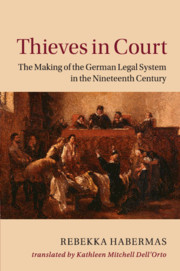Book contents
- Frontmatter
- Dedication
- Contents
- Acknowledgments
- Introduction: Questions Regarding Thieves, Reformers, Jurists, and Others
- PART I WHAT IS THEFT: QUESTIONS REGARDING THIEVES AND JURISTS – QUESTIONS REGARDING HONOR AND PROPERTY
- PART II HOW LAW IS MADE: EVIDENCE PRODUCTION
- 4 Techniques for Finding Truth – the Slow Production of the Modern State of Law
- 5 Techniques for Finding Truth and Other Types of Knowledge Formation: How Can a New Outlook Be Put into Practice?
- 6 Techniques for Finding Truth: How Do People Become Jurists and How Does Property Come into Being?
- PART III IN THE COURTROOM, OR WHAT IS LAW?
- Conclusion: The Making of the Modern Legal System – Thieves and Property
- Relevant Laws
- Bibliography
- Index
6 - Techniques for Finding Truth: How Do People Become Jurists and How Does Property Come into Being?
from PART II - HOW LAW IS MADE: EVIDENCE PRODUCTION
Published online by Cambridge University Press: 18 November 2016
- Frontmatter
- Dedication
- Contents
- Acknowledgments
- Introduction: Questions Regarding Thieves, Reformers, Jurists, and Others
- PART I WHAT IS THEFT: QUESTIONS REGARDING THIEVES AND JURISTS – QUESTIONS REGARDING HONOR AND PROPERTY
- PART II HOW LAW IS MADE: EVIDENCE PRODUCTION
- 4 Techniques for Finding Truth – the Slow Production of the Modern State of Law
- 5 Techniques for Finding Truth and Other Types of Knowledge Formation: How Can a New Outlook Be Put into Practice?
- 6 Techniques for Finding Truth: How Do People Become Jurists and How Does Property Come into Being?
- PART III IN THE COURTROOM, OR WHAT IS LAW?
- Conclusion: The Making of the Modern Legal System – Thieves and Property
- Relevant Laws
- Bibliography
- Index
Summary
As important as complaint records, visual inspection reports, and sketches were for structuring investigations, the interrogation of suspects and witnesses, together with the evidence produced by new techniques, stood at the center of the preliminary investigation. The hope was to obtain a confession, or at least crucial clues pointing to the perpetrators, from such interrogations. What were the procedures in this part of the investigation? Were there similar techniques for bringing the truth to light or separating true from untrue? Who actually performed these interrogations?
JURISTS
The people who directed or performed the interrogations were generally legally trained, whether the investigating judge, who conducted the interrogations, or the investigating procurator, who did not conduct interrogations himself. However, in cases that were to be tried later in high courts, the investigating procurator named the investigating judge and gave him instructions about what was to be asked. Substitutes not explicitly provided for in the code of criminal procedure might also be used – all, almost without exception, were jurists.
What did the role of these jurists in the preliminary investigation involve? This question is most likely to arise if the assumption is not made, as many contemporaries did and many more recent legal studies have, that jurists were simply “appliers of law”; in reality, they collaborated actively in the process of establishing justice. Did they exert primarily political influence, as more than a few contemporaries and many current research works believed and believe? And if so, were the Electoral Hessian jurists actually liberal, as asserted on the basis of the conflicts surrounding Ludwig Hassenpflug, or moderately conservative, as appears to be the case for Prussia? Or was their influence perhaps on a completely different level?
Actually, some facts seem to suggest that the jurists’ basic position on how justice was established and what verdicts were ultimately handed down was important. At least there are indications that political attitude was viewed as meaningful by contemporaries; for example, a conspicuous number of new appointments to important positions in the Electoral Hessian judicial system during the years 1848–1849, when the radical demands of the March Revolution that basically changed the judicial system seemed, at least for the short term, to result in a complete restructuring of the political and judicial systems.
- Type
- Chapter
- Information
- Thieves in CourtThe Making of the German Legal System in the Nineteenth Century, pp. 155 - 184Publisher: Cambridge University PressPrint publication year: 2016

